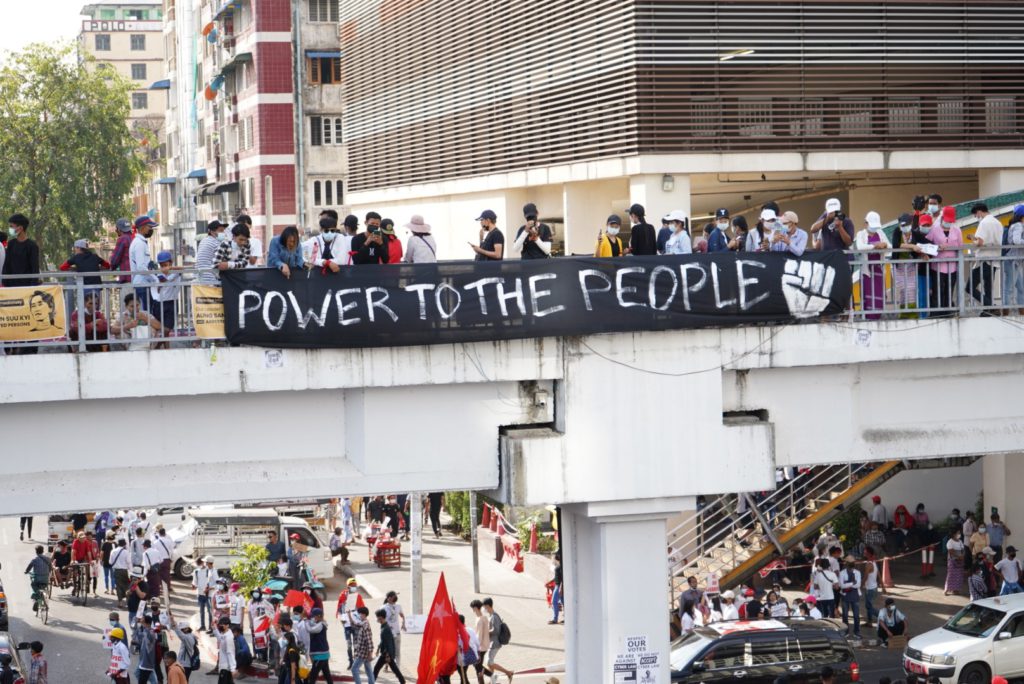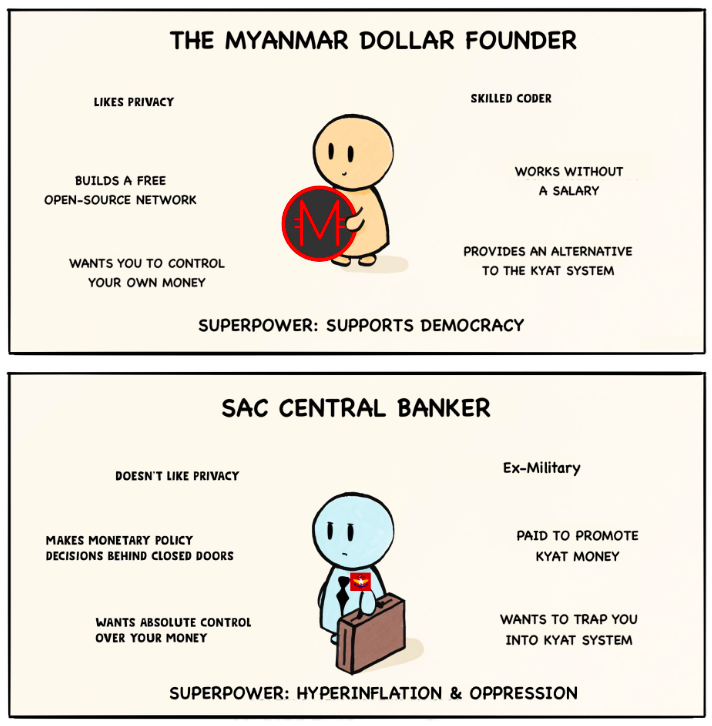On April 21, Win Ko Ko Aung, a Burmese social media influencer and activist, saw his name and Facebook page on state TV listed alongside other online creators charged with violating Myanmar’s Penal Code.
The charges of “disseminating information that challenges the state’s stability” came after Win expressed support online for nationwide protests against the February 1 coup. The infraction could lead to up to three years of imprisonment.
Due to his growing sense of insecurity given the escalating violence by security forces against protestors, Win had gone into hiding just one day before the announcement. Shortly after, he decided to escape the country via a six-hour journey across the hilly region between Myanmar and the western border of Thailand. He was disguised as a Burmese migrant worker, and by the time he arrived in Bangkok, he had his freedom. However, his bank account was frozen, his passport became invalid, and his bright future at home dimmed.
Win was able to survive the first days in Thailand thanks to a small investment of USD 100 he made in Bitcoin at the beginning of 2020. “When I had to flee the country, I had nothing. After landing in Bangkok, I liquidated all my Bitcoin and sold for around USD 500. This money partially helped me sustain my life in Bangkok while I was waiting for my refugee application to be approved,” he said.
Many Burmese like Win have started to experiment with decentralized currencies such as Bitcoin in the last few years, despite Myanmar’s central bank declaring in May 2020—long before the military takeover—that cryptocurrencies were unauthorized in the country, urging consumers to stop trading digital coins.
The crypto craze has continued since then. With Myanmar’s banking system on the cusp of calamity, a group of exiled Burmese launched a project with the hope to create a digital currency that could circumvent the central bank’s control and the junta regime—the Myanmar Dollar (MYD).

The Myanmar Dollar Project
Launched with an investment of USD 5,000, the MYD is based on Nano, a third-generation cryptocurrency created in 2015, one of the creators of the MYD project, who didn’t want to reveal his name, told KrASIA on messaging platform Discord. Similar to other cryptocurrencies such as Bitcoin, the MYD has a limited supply of 110 billion coins.
“We started working on the MYD project one month after the coup, as the crackdown became more violent. We knew that we needed to develop a way for Burmese people to boycott the entire military-led system, which is creating a vicious circle of money-making and oppression,” he said.
According to the MYD’s white paper, the MYD is a “free, instant, and eco-friendly third-generation cryptocurrency to support democracy in Myanmar.” The creators plan to freely distribute the 110 billion coins to different parties. About 55% of the coins will be allocated for the Burmese population—1,000 coins for each resident.
The team also wants to distribute 25% of the coins to the National Unity Government (NUG), a virtual government—without de facto power—formed mid-April by a group of ousted National League for Democracy politicians in exile or hiding, representatives from several ethnic minority groups, and activists. However, the collaboration plan with the NUG has not yet materialized.
The remaining 20% will be given to communities and charities, while a 5% share will be designated to marketing campaigns and events to spread awareness and recognition of the MYD.
“By encouraging Myanmar people to adopt a secure alternative financial system, where the pro-democracy government owns a pre-existing share, and the rest is fairly distributed to the people, it will both starve the military government and create a huge income source for the NUG,” the white paper reads.
Read more: From telehealth to ‘Zoom diplomacy,’ Myanmar’s government in exile embarks on a wave of unprecedented digital changes
How does it work?
To obtain the virtual coin, users need to set up an MYD wallet account through the coin’s application on Google Play store and Apple’s App Store. Then, users can claim their free coins via the MYD’s Telegram channel, the developer explained. So far, a total of 10,000 users have signed up for the project, each receiving 1,000 coins.
As of now, holders of the MYD can only use their coins to pay for a limited array of online services, among them virtual private networks and games, or shop for secondhand items on selected e-commerce sites that support the project. However, the team behind the MYD expects its cryptocurrency to grow to the point of being used for everyday payments while also facilitating free cross-border payments, foreign investment, and remittances.
The trading price of the MYD has jumped from MMK 0.5 to MMK 7 (USD 0.0043) per coin from its launch, KrASIA’s source said. MYD holders can trade their coins via MYD channels or groups across Discord, Facebook, and Telegram, the source added.
“MYD is just a vehicle that Burmese people can use to reclaim their financial freedom. They can vote with their wallets to restore democracy,” the team member told KrASIA.
Despite its growing popularity, the MYD faces many challenges. One big question surrounding the project is its scalability. The creator’s goal to distribute the coins to the entire Burmese population is possible on paper but very difficult to accomplish in the real world. For example, in Nigeria, the country with the highest adoption rate of crypto in the world, only 31% of residents have used or own a digital coin, according to Statista.
The junta is also likely to restrict the adoption of the MYD, as the project looks to provide alternative ways for Burmese residents to make transactions outside of the formal banking system in Myanmar. It will also not look kindly upon the project’s links with democracy movements and the NUG.

Improving users’ knowledge of digital assets
Even Win, who has been in the crypto space for a while, remains conservative regarding the MYD project. “Although Myanmar has over 20 million internet users, digital and financial literacy in the country still lag behind. Crypto is very new and bears insurmountable risks,” the 28-year-old said.
However, he said such initiatives could help grow users’ knowledge of digital assets in Myanmar. On his social media networks, he frequently uploads content about how different cryptocurrencies work, as well as some popular blockchain games. Many followers reached out with questions when he shared how he earned money via the play-to-earn game Axie Infinity on his Facebook page. “Fifty followers sent a message right after the post was made, asking me how to start the game or how to earn a living wage from the game. It was crazy,” he said.
Yet, not all of his followers are ready to dive headfirst into cryptocurrency. “My Facebook followers have polarized views towards crypto. Some say that it is a scam, while others think that it is a potential investment or interesting technology,” he said.
By the time of the interview, Win had started a new life in the US. Although he still struggles financially, Win has been able to sustain himself with around USD 300 per month earned by playing Axie Infinity every day, he told KrASIA.
As for the MYD project, the creators expect the Burmese population to trust and embrace their initiative. “It is all up to our people if they decide they want to use the MYD. A currency that supports democracy is ready for them,” the source said.
Disclaimer: Win Ko Ko Aung is not associated in any way with the Myanmar Dollar Project.
